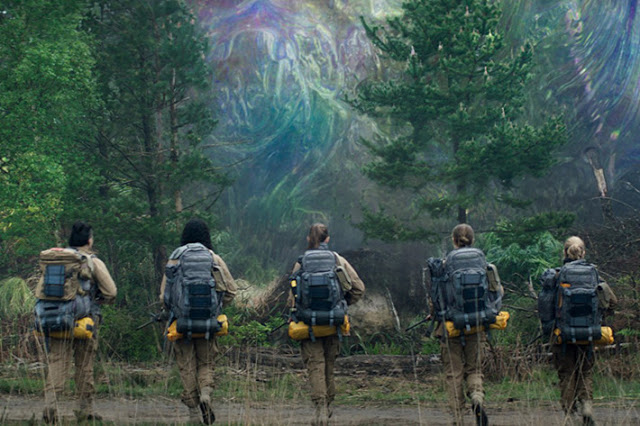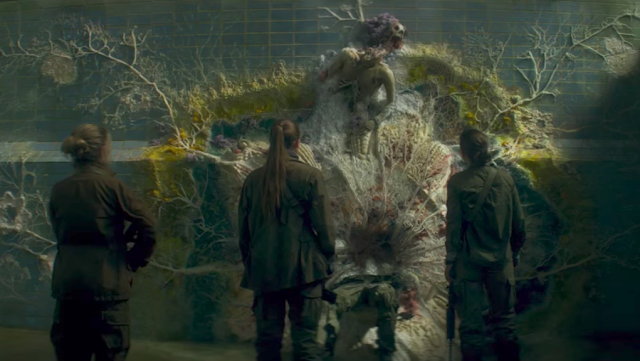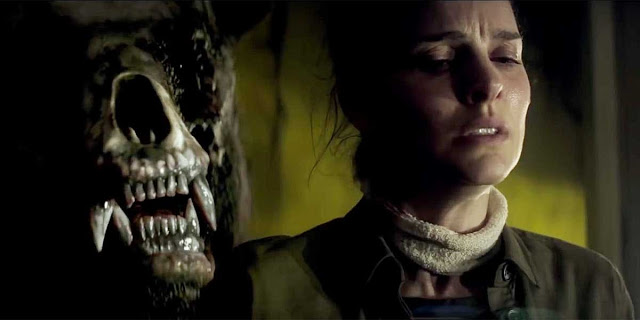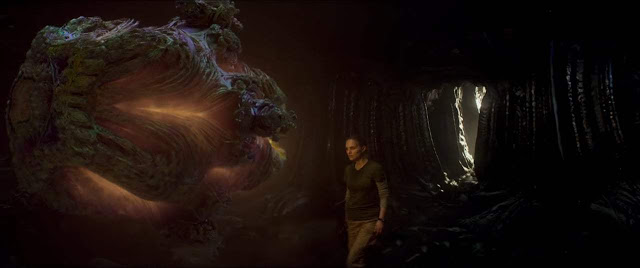It’s called “the Shimmer”. A kind of holographic hemisphere, it is a translucent dome of shape-shifting light and iridescent color, steadily encroaching across an unspecified swath of lightly forested land. Nobody knows where it came from, and nobody knows what it is or why it exists. All anyone knows is that once you step inside it, you never come out.
This is the tantalizing setup of Annihilation, Alex Garland’s consistently stunning, occasionally baffling thriller. A film of beguiling beauty and nightmarish horror, it is first and foremost the product of an auteur with a distinctive vision. In Ex Machina, Garland showcased a talent for taking recognizable cinematic patterns and twisting them into distorted shapes that bled with a disquieting intensity. Here, he makes that metaphorical gift literal; in Annihilation, bodies mangle and mutate, contorting into indescribable forms that blur traditional lines—between flora and fauna, between human and animal, between earthly and otherworldly. Yet it’s all so gorgeously done that it presents an intriguing contradiction. Rarely has a movie simultaneously seemed so lovely and so demented.
In its story of a determined woman venturing into the unknown, Annihilation can play like the cousin to Arrival, another film that explored the age-old concept of alien invasion with admirable scientific rigor. But where that movie enveloped you with its tenderness and humanism, this one shoves you under a magnifying glass and watches impassively as you start to cook. Its atonal vibes—which are only deepened by Geoff Barrow and Ben Salisbury’s drone-heavy score, plus some superbly eerie sound design—are palpable from the jump, when soldier-cum-biologist Lena (Natalie Portman, terse and tough) is surprised by the return home of her husband, Kane (Oscar Isaac, sadly not dancing a jig in this one). He’s a military man who’d been presumed dead after disappearing while on a black-ops assignment; Lena’s obviously happy to see him, but it’s plain that something’s off, and their would-be-joyous reunion transforms into a remarkably queasy scene involving an unnerving silence, a glass of water, and a dollop of blood. Before long, they’re both whisked to Area X, one of those shadowy government facilities with plexiglass walls and lots of hazmat suits. After Kane lapses into a coma, Lena learns that he’d previously entered the Shimmer, and she resolves to do the same in a desperate attempt to comprehend what went wrong.
She won’t be going alone. If you zoom out wide enough, Annihilation operates as a classic platoon picture, following a company of hardy soldiers as they wend their way through hostile territory on a dangerous mission. One notable difference, of course, is that the warriors here aren’t rough-and-tumble men but keenly intelligent women, each of whom specializes in a particular scientific discipline. Their nominal leader is Ventress (Jennifer Jason Leigh), a psychologist with nerves of steel who may know more than she lets on. Joining her and Lena are three suitably differentiated adventurers: withdrawn physicist Josie (Tessa Thompson, hiding her natural charisma behind a tamped-down persona and some glasses), resilient geologist Cass (Tuva Novotny), and salty paramedic Anya (Gina Rodriguez, excellent as always). During the well-paced opening act, Garland and his actors swiftly turn these scholars into characters, distinguished by their own motivations but unified by the desire to uncover the Shimmer’s mysteries.
Once they step through that nacreous bubble, what do they find? I can’t really tell you, and not just because I’m loath to spoil the film’s surprises; it’s difficult for words to satisfactorily illustrate the incredible sights and sounds that you and the characters witness. Annihilation is the brainchild of a feverish and prodigious imagination, delivering extraordinary images that are as disturbing as they are dazzling. But what’s even more impressive is how Garland, adapting Jeff VanderMeer’s novel, channels his visual inventiveness into his broader ideas. Fundamentally, this is a movie about change, and every astounding thing we see—slender trees that seem to dance with firelight, hulking beasts that defy species classification, animal-plant hybrids that bend into giant fractalized organisms—taps into that theme of metamorphosis.
If that sounds overly intellectual, don’t be fooled; this movie is just as interested in attacking your brain’s fear centers as in stimulating your cerebral cortex. (When Anya declares that she can see her fingerprints moving, it may encapsulate the film’s preoccupation with the fluidity of identity, but it mostly just creeps the hell out of you.) As a thriller, Annihilation is grueling and gripping, serving up a number of white-knuckle set pieces. A found-footage scene featuring an improvised surgery and a slithering intestine plays like the world’s sickest YouTube-provocateur video, while the depiction of the group’s gradually fraying loyalties unfolds with clammy tension. The movie’s best sequence is a suspense tour de force in which three of our principals find themselves strapped to chairs as they’re stalked by a giant creature that seems to be part-dinosaur, part-alligator. Their frozen terror may remind you of Jurassic Park, but Garland adds a chilling detail: As it lumbers toward its prey, the creature emits a muffled scream in the garbled voice of one of its recent human victims. Good luck going on safari after seeing that.
As Annihilation journeys deeper into its literal and metaphorical abyss—Lena’s ultimate destination is a near-mythical lighthouse—it resists the temptation to resolve its metaphysical puzzles with cookie-cutter action; on the contrary, the film’s eye-catching third act, which recalls 2001: A Space Odyssey, is its most brazenly enigmatic. But while Garland’s refusal to supply a generic climax is admirable, it doesn’t necessarily render Annihilation satisfying. The movie’s final scenes are hugely impressive, a triumph of deliberate filmmaking and sinuous special effects. Yet they are also oddly disconnected, operating at a philosophical remove that diminishes their intensity and blunts their impact. Perhaps the film’s ending is brilliantly inscrutable, perhaps it’s nonsensical sci-fi babble, but either way, it’s difficult to respond with anything beyond a vague impression of, “Wow.”
Of course, in today’s idea-starved science-fiction landscape, a vague “wow” hardly counts as condemnation. And as challenging and frustrating as it can be, Annihilation remains a fascinating cinematic document, one that recursively echoes its own obsessions with mutation. The movie itself is a cross-breed: an art film disguised as a thriller. Or maybe it’s a thriller disguised as an art film. I’m not really sure. And that uncertainty—the sensation of grasping at an idea just out of reach—is Annihilation’s real signature, even more so than its majestic visuals. Stumbling out of the theater, you may not know exactly what you’ve just seen. But you’ll know for damn sure that you’ve seen something.
Jeremy Beck is the editor-in-chief of MovieManifesto. He watches more movies and television than he probably should.




